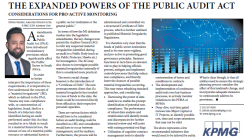Dhiren Naicker - The Expanded Powers Of The Public Audit Act2019-09-09 CONSIDERATIONS FOR PRO-ACTIVE MONITORING Amendments to the Public Audit Act (PAA) have introduced revolutionary provisions which significantly affect the Public Sector in South Africa. In order to better interpret the importance of these requirements, it is imperative to first understand the concept of a "material irregularity" (MI), which as defined in the PAA, "means any non-compliance with, or contravention of, legislation, fraud, theft or a breach of a fiduciary duty identified during an audit performed under this Act that resulted in or is likely to result in a material financial loss, the misuse or loss of a material public resource or substantial harm to a public sector institution or the general public." In terms of how the MI definition meshes into the legislative amendments, the key changes now permit the Auditor General (AG) to refer any suspected material irregularities identified during an audit to a Public Body (such as the Public Protector, Hawks etc.) for investigation. The AG may also choose to investigate possible material irregularities internally if this is considered more practical. The most crucial change however is the introduction of a "Certificate of Debt". The new pronouncements direct that if a material irregularity has resulted in a loss of funds to the state, the funds could be recovered directly from officials in their respective personal capacities. There are various factors which would have to be considered before an audit finding could be classified as a MI, and consultation would have to occur between management, and the auditors. Furthermore, the process will be administered and controlled via a structured Certificate of Debt process, which is further outlined in published Material Irregularity Regulations. It is therefore very clear that the heads of public sector institutions need to be even more vigilant, and pro-active in promoting good governance principles. Business functions in turn have an elevated role to play in helping officials prevent, mitigate and implement controls/processes that help reduce non-compliance, and thereby lower the chances of possible material irregularities occurring. This may mean rehashing standard approaches, and considering:
T: 031 327 6000 E: dhiren.naicker@kpmg.co.za W: www.kpmg.co.za |
Dhiren Naicker - The Expanded Powers Of The Public Audit Act
Copyright © 2025 KwaZulu-Natal Top Business
